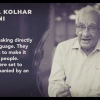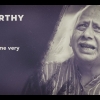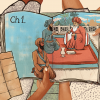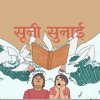We are going out on an ‘archaeological digging’. ‘Archaeological digging’ is an alternative to history used by Michel Foucault for a specific reason. When we read a text, which is full of multiple discourses, we actually read these discourses according to their spatio-temporal contexts. Here we will highlight Bangla vyaakaran (Bengali grammar).
Bengali grammar is the ‘subject’—as we say ‘subject’, a set of questions arises as to how this ‘subject’ is formed. We are trying to understand why is Bengali grammar required? Why was it created? Why was it included in the public domain, especially in the school curriculum? Furthermore, we will also try to understand the attempts at writing ‘Bengali grammar’ from the 19th century, vis-a-vis their spatio-temporal contexts, and, how the Bangla nation was formed, and what is the association between the nation and the grammar. In other words—how did the Bengali grammar become a discipline or a subject by making the language an object? How was the discipline of Bengali grammar constituted? It is also important to ask why? ‘Why’ did it come into existence?
Human beings speak. Sundering their speech into multiple parts, to create a speech on the speech, is called meta speaking and is one of the objectives of vyaakaran. But why do I need to sunder my language into fragments? When I speak, I am not conscious about different nuances of vyaakaran like-kri [‘to do’ verb], tadhita pratyay [nominal suffix] or samas [compound]. My utterance is a spontaneous act which is in-built in our corporeality, which is already there, spontaneously available. That is, if I can use a limited number of arbitrary vocabularies to construct unlimited sentences according to my ability, then why do I need to learn vyaakaran in order to learn a language? This is a generic question, as this will be applicable to all the languages in the world. But when I say Bangla vyaakaran, I will try to understand the meaning of these two words separately: Bangla (Bengali) and vyaakaran (grammar). Let’s begin with the word ‘Bangla’ first. The sense of a Bangla nation is not very far back in history; it took about three centuries to create the concept of this nation. We have imagined this nation—the territory of Bangla. Mind you, if we ask ourselves, a set of questions regarding the Bangla nation, we will find major loopholes. For instance, the political geography called the Bengal Presidency spanned from Brahmadesh (present day Myanmar) in the east till Punjab in the west. Does it imply that this was Bangla nation state? Clearly not. The imagination of a Bangla nation began after the arrival of the British. Prior to that, I had never imagined myself as the citizen of the Bangla nation. Terms like nation, citizen, these legal terms have been adopted from the Westerners and have been alternated. We not only have adopted such terms but also fiddled around with them. Secondly, during the construction of Bangla, Asomiya or Odiya were not being considered as separate entities, they were all part of Bangla. Later when they launched various language movements, Asomiya, Odiya, came to be recognized as separate languages. Please make a note, when an Odiya or an Asomiya speaking person talks to me, our mutual intelligibility is about 70 units. I am trying to explain the idea through units. Whereas, with Sylheti, which is considered a dialect or a sub-language (the term dialect is very problematic) of Bengali; I share 30 or 40 units of mutual intelligibility. If that is the case, then how Sylheti becomes a dialect of Bengali, and languages like Odiya or Asomiya with which I have more similarities in terms of language, gains individual identity as separate languages? Please notice that a different political project is at play behind such language constitution. In such constitutions, a relationship develops, based on the centre (kendra) and the periphery (pranta). In this arrangement the centre (kendra) controls the periphery (pranta) which becomes ‘sub-’ or minor. In this conceptualization of a centre, it is seen, that a set of non-linguistic reasons are at work. For example, if I say (as a part of a linguistic discourse) that the language (Bangla) used in Calcutta is the real language and rest are dialects I end up creating a binary of centre and periphery. To give more prominence to the Calcutta language (Bangla), we write a grammar for it. We have not only written a grammar but have crossed several other stages. The one at the centre tends to become a power centre due to many allied reasons which control this process. We will call this an ‘over-determined state’. Now think what all were being set up in Calcutta—printing press, then gradually radio came in the age of printed newspapers, electronic media also came in and then television. So everything is centralized in Calcutta and other places became periphery. And languages of these peripheries were demeaned and they remained as dialects (sub-language) as if they had not enough right to become a language! So the idea was one must get educated in the language of the centre.
Now-a-days we do not use the word dialect anymore and try to recognise the diversity; arbitrary diversities in languages. We choose one element from this diversity and turn it into a standard language, or a central language. Note the word ‘standardize’. The term ‘standard tool’ is connected with industrialization. That is to say, it is pre-determined whether you will use a three-pin plug or a two-pin plug at home. Things have to be commensurate like the car you are buying must have commensurate tyres. Standardization became very important at one stage during the development of capitalism as everything needed to be of the same size that fit everywhere. Similarly, the standard language, language of the centre, will receive more capital investments as without it there will be no printing press, no publishing, no radio and no television. So there is an investment in order to standardise, investment of capital makes a language major or minor. Hence investments made on the language (Bangla) in Calcutta controlled its discourse. A language which gets standardised is thus constructed in an investment-controlled environment and grows to be a centralized language of dominance. From the need to constitute a standard language and to promote it further, what was necessary was vyaakaranikaran or grammaticalization. So stages are standardization, also known as sannitakaran or some scholars term it pramitakaran, which leads to grammaticalization or vyaakaranikaran. So the grammaticalization is of the central standardized language.
To construct a sacred form of the standardized language there was a requirement of a shaastra (prescriptive treatise) that which saves one from shaasan (punishment) through anushaasan (code of instructions). Anu+Shaasan, what follows after shaasan. Such codes are manifested through vyaakaran (grammar). Let me give an example, a tale on grammar’s origin. Around 1492, Spanish grammarian Antonio de Nebrija proposed a project to the Queen of Spain, Isabella. Around the same time another project was being proposed in Spain by Columbus that of discovering India which culminated in the discovery of America and the place was colonised after major massacre. Nebrija’s principal objective was to write a book of grammar, but for the Queen’s language. As described by him this project was as a ‘weapon’ which was capable of transforming the subject’s language into Queen’s language. That is to say, the centre was acquiring the language of the periphery through the structure of grammar. So in view of this project, it is important to understand how theories of vyaakaran were being advocated by sundering language in fragments. But before that, I would like to draw your attention to the fact, that I have been using vyaakaran and grammar, interchangeably, as if one is translated into the other. But please note that there is an objective difference between vyaakaran and grammar. What are the differences?
Suniti Kumar Chatterji in his book Bangla Vyaakaran (1939), attempts to define vyakaran which is a little bizarre: 'vyaakaran is that book or treatise which allows us to speak our language, perfectly'. Now what do we mean by ‘perfection’ here? When I speak to you, a communication develops, you comprehend what I say and I comprehend what you say. Is this act of comprehension not enough? What kind of ‘perfection’ then vyaakaran ensures -becomes a point of enquiry. Chatterji’s definition was challenged by Haraprasad Shastri way before 1939 who claimed that vyaakaran and grammar are not the same. This debate was prevalent for other genres as well—whether epic is maha-kavya, or whether natak is similar to drama, play, or theatre; whether upanyas and novel are the same. Thus there was a tussle regarding the translation of vyaakaran as grammar.
Haraprasad Shastri says ‘grammar is that treatise, through which a language can be spoken correctly.’ And what is vyaakaran? What Suniti Kumar Chatterji did in his book, was to compile a set of notes (which were published posthumously). In these notes we find that he has referred to a specific definition of vyaakaran, from Patanjali’s Mahabhasya and Bhartrihari’s Vakyapadiya. The definition is as follows: ‘vyakriyaante vyutpadyante anena, iti vyaakaran’ [vyaakaran is something that analyses the etymology of words by sundering words] that is ‘vi-aakaran’ [detailed description] meaning ‘vi-utpatti’ [etymology or derivation]—a treatise that analyses a word or a sentence by sundering it, is called vyaakaran. So, grammar and vyaakaran are not the same. There are various premises where these two terms somehow get blended which can be termed as ‘epistemological amalgamation’, borrowing from Bassler.
Such ‘epistemological amalgamation’ did not only take place between vyaakaran and grammar, other ideas also got incorporated and associated. I am not only referring to Bassler, but this idea of ‘epistemological amalgamation’ comes from the understanding of hybridity, for being in [an erstwhile] colony and that is how I want to present this terminology. Alongside grammar and vyakaran another branch of knowledge got amalgamated, that is Philology. The origin of Philology was through Orientalism. Those who study its politics, the politics behind creation of the orient through differentiation between the oriental and the white people, have observed that there was an imperialist conspiracy behind the origin of this branch of knowledge. What kind of conspiracy? To put it in a nutshell, I am white and I am going into the domain of brown people and trying to build a relationship. There are two driving forces behind such relationships—first, domination, that is, occupying a place by force, with guns and canons, as Columbus did in America. Or else to hegemonize, and get into an ideological agreement with the ‘natives’ of that place. This ideological agreement was spearheaded by the Asiatic Society. When it was set up towards the end of the 18th century, its leading figure, William Jones, proclaimed that many Indian languages have close similarities with European languages and wherever he found such 'close similarities', a good oriental relationship was immediately forged with the white man. So good oriental subjects were those who knew Sanskrit or any of its sister languages, which according to him, shared relationships with Greek, Latin or German. By pointing to these relationships, one was establishing a claim—'I am one of you', which amplifies the scope of hegemony. Consequently, the language with which I cannot find anything in common, I term them ‘bad orient’—like Semitic. So people who belong to this language group are bad because the white man had the authority to decide who was good and who was bad. This comparison allowed a kind of agreement between the centre and the periphery which led to the formation of Philology, or what we call Comparative Philology. Soon Philology started to make its way to the vyaakaran books, and was capable of impacting it. So the progression was grammar, vyaakaran, philology and then linguistics, which was born only after 1915 and joined the course.
Many scholars will stumble on the threshold for my conclusions because I am creating a threshold of grammar beside vyaakaran; philology beside grammar; and yet again, a threshold of linguistics. They will not agree to such commencements. As for them, the focus is study of languages and any work around it will be philology, grammar and linguistics all rolled into one. The epistemological thresholds become redundant because of the way they analyse language. All gets merged and it is only natural in a colony where hybridity plays a major role, which also leads to mimicry. Mimicry too finds a place in grammar books—whether I am being able to (re)arrange my language according to the language of the ‘other’! To cite examples, there are many! Let’s begin with a rather simple sentence: ‘Ram Ravan ke maarlo’ [Ram killed Ravan]—in ninth and tenth standards of (Bengali Medium) schools, students are asked to change the voice of this sentence, which becomes: ‘Ram karttrik Ravan hatya holo’ [Ravan was killed by Ram]. My question is which Bengali speaker will construct a sentence like this? Hence the process of passivization is forcefully introduced in Bengali language. Also notice the introduction of the role of karttri vachya [active voice] of Sanskrit vyakaaran. So, ‘case’ and ‘karak’ were made to mean the same. Case is derived from the Latin root word cassus which is derived from Greek ptōsis, meaning ‘to fall’. Each word has a bibhakti (case) attached to it. Another example ‘Nepoy maare doi’ [ Nepo steals the curd] is similar to Ram Ravan ke maarlo, where Ram has no case (shunya bibhakti), and Ravan gets ‘ke’ bibhakti. Please notice a kind of bent in these sentences. On the other hand, karak is about ‘who’ is playing ‘what’ kind of thematic role in a sentence. Very easily we construct ‘Ram killed Ravan’! where Ram is the hero and Ravan is the villain. This hero-villain relationship remains intact even after the change in voice. In Bangla vyaakaran, ‘case’ and ‘karak’ got jumbled and scholars have observed that students were petrified of studying ‘karak’. In order to express this situation, (which I am reiterating as an ‘epistemological amalgamation’), Hara Prasad Shastri uses a brilliant term, Khichudi (hotchpotch): 'what is working in the name of Bangla vyakaaran, is nothing but Khichudi (hotchpotch)'. How is Khichudi prepared? With different kinds of green leafy vegetables mixed with lentils. If we study the history of khichudi, we will see that lentil seeds were not produced in Bengal per se, and were procured from outside, as well as potatoes, which form an integral part of Khichudi, was also imported from outside. So basically ingredients imported and migrated from outside were mixed to prepare Khichudi. so the allegory of Khichudi is very important. According to Sukumar Sen, 'Bangla vyaakaran has become a ghontopaak [mixed vegetable dish].' For which, Bangla vyaakaran has turned into a nightmare. We may recall a section from Sukumar Roy’s HaJaBaRaLa ['A Nonsense Story']:
The verdict was, Baldy will be imprisoned for three months and will be hanged till death for seven days. As I began to think that I should protest against such an unjust justice, the goat bleated 'VyaakaraN Singh' and then ran into me from behind to bit my ears off. Everything around me began to get messed up and the goat’s face metamorphosed into that of my mejo mama [second maternal uncle], in the end. I realized my uncle was twisting my ears while admonishing me: 'So you have been sleeping in the name of learning VyaakaraN!
So learning vyaakaran is nightmarish and horrific according to literatures. Sukumar Roy in his play Bhabuk Sabha (The Thinkers’ Assembly) writes:
Dictionary, Grammar and that Almanac! Alas!
Nothing but a bluff and a pot full of grass!
By bracketing dictionary, grammar and almanac together as a bluff and a pot full of grass, Sukumar Roy was possibly trying to create an alternative discourse of vyaakaran. But was it Sukumar Roy alone who was attacking vyaakaran? And why attack vyaakaran in the first place? Around the turn of the 19th century, there was a demand that Bengalis need their own history, Haraparasad Shastri asserted at Bangiya Sahitya Parishad (Bengali Literature Council) that 'we need a pure vyaakaran for Bengali'. This demand took the shape of a desire. What kind of desire? Desire to create a Bengali nation, which needs a ‘centralised’ language, and if that language does not have a treatise, a vyaakaran, there won’t be possible hegemonization of the periphery through that centralised language.
If we notice, immediately after this demand became public, Dwijendra Lal Roy wrote a play called Chandragupta. There is a relief character in the play called Katyayan. As it is well known Katyayan, is one of the three grammarian gems: Panini, Patanjali and Katyayan—missionaries and visionaries of vyaakaran. In the play, whenever Chanakya talks about political diplomacy, economics, Katyayan keeps interrupting and what does he say? He says only Panini has answers for everything beginning with how political problems can be solved? Thus, Katyayan keeps quoting from Panini—'Panini said this, Panini said that'. These quotes of Katyayan, become fodder for audience’s laughter. This again proves that there was a mounting resistance against vyaakaran.
There was a demand and likewise there was also an attempt to create an alternative discourse of vyaakaran by artistes and litterateurs. It will wrong if we don’t take into account this alternative discourse and only emphasize on vyaakaran—the amalgamation. Let’s go back to where we had begun, let us rewind. We said we will try to understand the spatio-temporal contexts of Bangla vyaakaran and after having understood these contexts I would go on to excavate the discourse of vyaakaran. Writer Satinath Bhaduri will help us in the process—his short story Vaiyaakaran, has a character, Turant Lal, who is not a relief character like Katyayan, but his colleagues and students laugh behind his back because like the rules and regulations of vyaakaran, his conduct is tied by the chains of the discipline. There is no faltering from the structure. While portraying Turant Lal, Bhaduri puts a question in his mouth: 'the rules and regulations of grammar are static irrespective of time and space. Then why does environment influence the dissemination of vyaakaran? How contexts define the discourse of vyaakaran even occurs to someone like Turant Lal who is an ardent follower of the discipline. Is the discourse of vyaakaran oblivious to time and place or do the treatise of the state and the society become the treatise of vyaakaran? A book of vyaakaran is packed with rules and regulations; dos and don’ts—it gives prescriptive commands and imperatives. So do we continue to speak our everyday language following the commands of vyaakaran? Don’t we deserve the space to speak our mind? Should we follow the rules of vyaakaran and tune the strings of life according to the decrees of vyaakaran? There are a lot of discourses against this strict structure. Certain educational systems have been developed in such a way that the restrictions of vyaakaran of the centralized language has been completely nullified. I realized this when I learnt about Eklavya (Madhya Pradesh) who are trying to work in the field of education with the less privileged; who think education (shiksha) is not punishment. Education (shiksha) at times appear to be punishment (shasti), in Telugu, shiksha (education) actually means punishment. In Bengali sometimes we say, 'I shall teach you a lesson…'
That shiksha (education) is actually not a punishment—has been reiterated by several scholars be it Rousseau, Gandhi, or Tagore, and they have maintained that learning should be fun. There should not be any fear, panic or nightmare in learning vyaakaran. Haraprasad once said—'publishing books of vyaakaran amounts to waste of guardians’ money and students’ brain damage.' Even Ram Mohan Roy had raised similar concerns years ago, when Sanskrit College was being set up, Roy wrote to the then Governor General that there was no need to teach ‘grammatical niceties’. Interestingly, even he had written a grammar book, which was published both in Bengali and English. But, he had clearly mentioned its purpose—to teach Bengali to the British, to create, like I said, a ‘negotiation’ between the ruler and the ruled. How will the ruler rule if they don’t know the subject’s language or the subject be ruled if they don’t understand the ruler’s language? These were areas of governmentality but how to build an alternative? Is it possible to make a system alternative to this ‘brain-damage’ discourse?
When I was researching on the archaeology of Bangla vyaakaran, I came to know about Eklavya. Based in Hoshangabad, Madhya Pradesh, they do not cheat in the name of teaching. They replaced the word teacher with facilitator, and made learning a process of mutual understanding. From the very beginning they have been critical about grammar which they have been propagating. Just like, we do not need to learn about laws of gravitation in order swim or cycle; similarly, we don’t need to learn grammar, in order to speak, as speaking is a spontaneous act. For example, eminent bowlers who are known for pace bowling—like Courtney Walsh, Kapil Dev, Waqar Younis, Wasim Akram—can swing a ball, now do they learn laws of ‘aerodynamics’ to master these techniques? No, but that does not mean that laws of gravitation or aerodynamics are not useful. Those who are interested can study it. Likewise, those who have the willingness and luxury; and do not have to toil to earn a living, may study grammar by analysing language. But, to impose this on children is a crime. Eklavya has been able to identify with this idea and have proposed an alternative education system, which can be called 'Deschooling Society', borrowing the name from Ivan Illich. Or modelling on Paolo Freiere’s theories of fourth theatre (education through theatre), we may try to develop our education system—where there will be no teacher and everyone will be a participant. This process will give rise to multiple voices. Soviet linguist, Mikhail Bakhtin have written about multiple voices or polyphony—he confirmed that polyphony is pre-determined and follows no structure. Hence abruptly, an image or a festival or celebrations can be created—a situation of carnival is formed. The question is should we acknowledge this act of polyphony, or should we implement the totalitarian set of rules of grammar?
I see my language bleeding, when I look at the fragmentation of my language in the name of regulations of vyaakaran; I propose that there should be no grammar but ‘anti-grammar.’ By anti-grammar, I mean the ability to recognize the free flow of my language from within and when no one will kill me or punish me for appreciating the spontaneity of my language. Here I need to make a difference between the act of speaking and freedom of speech which has been restricted at different stages in history and should be opposed. Looking at the gruesome state of our languages, I personally feel, the word ‘anti-grammar’ should be introduced. I will prefer to spell grammar with ‘er’ (grammer)—and not ‘ar’. I have noticed many students writing this ‘wrong’ spelling. I want to move forward with this apparent mistake and not make things bloodier. I propose to have a dialogue. I wish to move towards a democratic agreement in which I can continue a dialogue. Once a Baul said to me: 'what kind of a linguist are you, that you can’t even sustain a dialogue?' It is important to continue dialogues which is under immense threat today. It is true that all of us are talking, but no one is speaking from our mind. I wish to change this situation by creating a space for dialogue, to reach a democratic ground. So I wish to create a space of equality which is free from constitutional rules and regulations of grammar or in simple words, where ‘knowledge is free’. The person I am quoting, Rabindranath Tagore, once compiled few articles on a particular module of grammar from different dictionaries and kept them inside a leather box. After two years when he opened the box, he saw a little girl had thrown out those papers and have replaced them with a few dolls. Looking at those dolls Tagore said:
I so wish that every grammarian has a little girl like this in their household who can erase nominal suffix from the world and encourage this kind of staunch idolism in its place, and only then the world will the way be less thorny for children.











